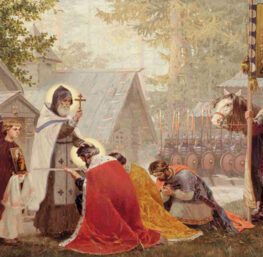US News and World Report Dan Gilgoff
Democrats kick off a multifront campaign to connect with religious voters
Just because Democratic Party Chair Howard Dean got in hot water last month for calling the Republicans “pretty much a white, Christian Party” doesn’t mean he’s not hunting for white, Christian votes. At a meeting last week with liberal evangelical preacher Jim Wallis–which began with a prayer led by Dean’s chief of staff, who is a Pentecostal minister–Dean drilled the antiabortion Wallis on how to make party rhetoric on abortion rights more values-friendly. “Nobody is pro-abortion,” Dean said, according to a party official. “But do you want the government telling you what to do in your personal life?”
Dean is doing more than tinkering with the party line; he’s spearheading a new campaign to woo religious voters. There’s been so much outreach to religious groups in his five months at its helm that the Democratic National Committee hired an experienced Capitol Hill aide last week to help manage the effort. Congressional Democrats, meanwhile, have stepped up consultations with religious leaders. After taking a hit among “values” voters in the last election, Democrats are strategizing on how to play up what they call the moral–and in some cases biblical–underpinnings of their political convictions. Complementing the official effort is a crop of new, religiously affiliated advocacy groups. “Democrats had [thought] it a bit unseemly to wear your religion on your sleeve,” says South Carolina Rep. James Clyburn. “But those of us who’ve been walking the walk . . . have decided it’s time to talk the talk.” The success of that effort could determine whether Democrats start winning elections again.




Just an observation, not a major opus
In general, my reasoning goes like this. Marxism has a cultural aspect as well as an economic/political aspect. Engels wrote a great deal about the nuclear family and how he (Engels) thought that the nuclear family was a barrier to progress in the socialist future. Marxism is expressly secular, as such, it would, in theory, oppose all religion. However, in practice, Marxism, having arisen in Europe has actually exerted its influence against Christianity above all other religions.
If a society’s religious roots and mores have been weakened or destroyed, an opening exists for Islam. Secularism is one cold cup of porridge. Most people cannot take the emotional sterily of true atheism. People want some sense of purpose, a moral code, a sense of belonging to a community. These are all things provided by religion. If Christianity is represented by something as thoroughly decadent as say the Anglican Church of England, many people will look elsewhere.
Converst to Islam frequently talk about the “sense of belonging” to a large family. The social structure of Islam is very tight, very strict, very clear. Everybody and everything has its place. I will repeat an anecdote that I have posted to this board before. An Italisn woman who was raised a Christian was asked why she married a Muslims man, given that Muslim men beat their wives and can be harsh husbands. The answer was that at least Muslim men DID marry and DID create a household and DID act as a leader of the family. By contrast, modern Italian men had become accustomed to the convenience of casual sex and saw no reason to move into the position of responsibility and committment required from a father and head of household. This stinks, of course, but there you have it.
Missourian,
You wrote, “This is just another condescending jab at Americans of conservative stripe. Conservatives are ill-informed, narrow-minded and don’t “travel” much. Therefore if David met an American in Europe she must have been the liberal, enlightened type. Just can’t strain that congenital condescension from your worldview can you.”
What I would answer to this is the following. No one, save for some posters on this Website, has ever accused me of being left-wing. I’m a Marine Corps veteran, work in a highly conservative industry, and am an Orthodox Christian as well. Those things typically aren’t associated with leftism.
But I also lived in Poland for many years, married into a Polish family, and traveled widely in Europe. This confirmed many of my already right-wing biases. I had to lay off employees because the payroll taxes were too high. I had to bribe corrupt tax collectors to keep my business open. I had to bribe doctors to get health care, even though 50% of my earnings were confiscated in taxes. All those things only made my screaming dislike of socialism into a positive fever of hatred.
However, certain aspects of my American character were radically changed by living as an immigrant in Europe. How often do we say, without even thinking of it, “America is the greatest nation that ever existed!” That is an article of faith in this country. America is number one, God’s own nation, a light unto the world, a chosen place to fulfill God’s purpose for this Earth.
Well, I don’t think that anymore. America is my home. It is my country. It is a place I am proud of the way I am proud of my mother. She may be the best mother in the world, or not, but she is mine and I love her. Poles love Poland. They have a right to love Poland, it has a tremendous history. The Poles crushed the Turks outside Vienna and saved Western Civilization. The English are the root from which our own nation grew. Germany gave us some of the greatest composers and writers of all time. France gave us some of the greatest art. Italy has given us the greatest architecture. What American city compares to Rome? Or to Prague, or even Cracow? What writer compares to Goethe, or Tolstoy?
America’s constant chest thumping annoys the entire world. We are the big kid on the playground constantly in everyone’s face saying, “I’m bigger than you! I’m richer than you! My daddy can beat your daddy!”
Sure we have a lot to be proud of, and we should be proud. Quietly, happily proud. But that isn’t how we act, that isn’t how we behave. I lived in Europe long enough to lose this trait, but most Americans blow through and only manage to see the pretty castles and come away thinking Europe is similar to a Disney attraction, rather than the root of all Western Civilization and the cradle of Christendom.
Other people have a right to love their nations. Most of them (Koreans, Japanese, and Chinese excepted who behave the same way we do) do so while understanding the tendency of other people to love their own. I’d like to see Americans adopt this strategy. Not multi-cultural PC idiocy like we push in the schools today, but a genuine dedication to letting other people around the world be who they are in their own countries and respecting it.
Europe has problems with Muslim immigration and a massive social welfare state they cannot afford. I think the Europeans will turn this around. I have a hardtime thinking that a continent that can survive the Turks, the Black Plague, and two World Wars will go down without a fight. Could be wishful thinking, but then perhaps I prefer a little optimism.
Point taken, Glen
Clouds
The American economy is seriously threatened by the decline in science and engineering education. This isn’t just another standard complaint that every generation makes about the generation coming up. It is a objective fact that fewer and fewer engineers earning degrees in America are American citizens. While it is true that many American educated non-citizens contribute to the American economy, the decline in the number of native engineers is trouble. The state of mathematics education in the secondary schools is abysmal.
The balace of trade issue, huge Medicare entitlements, the yearly deficit and the Social Security mess are all vultures circling in the economics skies over us.
Note 54: Missourian, you may find the following article interesting on the sharp decline in H1-B visas (which are often used for software engineering positions).
Quote:
“Last year, for the first time, more than half of 195,000 possible H1-B visas remained unclaimed. This year, with little fanfare, the H1-B visa cap will slip back to 65,000 – the number it had been before the onset of dot-com fever.”
Demand for tech workers has settled to a reasonable facsimile of what the existing market has to offer, though I’ve also seen a little pickup in opportunities as of late. I’m also seeing more employers hiring US citizens as opposed to those cheaper H1-Bs (at least in OH). There’s just a more reasonable balance between supply of workers and the demand for them in this area right now, so I wouldn’t fret (at least yet) that many are going into other fields besides science/engineering.
I’m a little more concerned about those $4/gallon gas prices we’ve been warned we’re going to see. This will have a major impact on the transportation industry (which will also effect us by a hike in prices). Add to that it will now cost around $60-80 to fill up your tank. I know this “hybrid” thing is seen as just another whacky environmentalist toy, but considering that it will cost as much for most people to fill up their tanks as the car payments themselves, I’m thinking we’d better look more seriously at this option.
Thanks,JamesK
Interesting note, thanks for the reference, James K. Companies can outsource to India directly using the internet for communication and transmission of work product. This can happen without actually bringing a live human being from India to the United States.
There does exist the beginning of a counter-trend. Indian high-tech companies are complaining of a brain-drain, they want to hire their own high tech graduates. This is a good thing. I fully welcome India’s progress, it is a great example for the entire Third World.